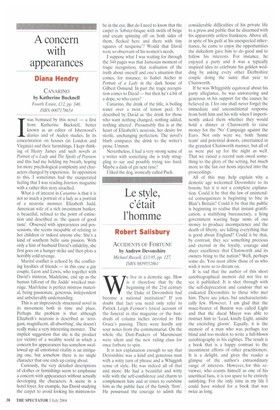A concern with appearances
Diana Hendry
CANARINO by Katherine Bucknell Fourth Estate, £12, pp. 340, ISBN 0007178654 Iwas bemused by this novel — a first from Katherine Bucknell, better known as an editor of Isherveood's diaries and of Auden studies. In its concentration on houses (in London and Virginia) and their furnishings, I kept thinking of Henry James and such novels as Portrait of a Lady and The Spoils of Poynton and this had me holding my breath, hoping for more psychological complexity and characters changed by experience. In opposition to this, I sometimes had the exasperated feeling that I was reading Interiors magazine with a rather thin story attached.
What is of interest in Canarino is that it is not so much a portrait of a lady as a portrait of a neurotic monster. Elizabeth Judd, American wife of a rich investment banker, is beautiful, refined to the point of extinction and described as 'the queen of good taste'. Obsessed with appearances and possessions, she seems incapable of relating to her children or indeed anyone else. She's a kind of southern belle sans passion. With only a hint of husband David's infidelity, she first goes on a hunger strike and then plots a horribly cold revenge.
Marital conflict is echoed by the conflicting loyalties of friends — in this case a gay couple, Leon and Lewis, who together with David's mistress, Madeleine, end up as the human fall-out of the Judds' wrecked marriage. Madeleine is perfect mistress material, being passionate, generous, independent and unbelievably undemanding.
This is an impressively structured novel in its movement both in time and place. Perhaps the problem is that although Elizabeth's neurosis is described as 'arrogant, magnificent, all-absorbing', she doesn't really make a very interesting monster. The implicit suggestion that she is the product (or victim) of a wealthy world in which a concern for appearances has somehow swallowed up all emotional vitality is an intriguing one, but somehow there is no single character that one ends up caring about.
Curiously, the very detailed descriptions of clothes or furnishings seem to emphasise a concern with appearances without actually developing the characters. A scene in a hotel foyer, for example, has David studying the carpet to avoid looking his mistress-to
be in the eye. But do I need to know that the carpet is 'lobster-bisque with swirls of beige and cream spinning off on both sides of them, flecked here and there with tiny squares of turquoise'? Would that David were so observant of his women's needs.
I suppose what I was waiting for through the 340 pages was that Jamesian moment of tragic recognition, that realisation of the truth about oneself and one's situation that comes, for instance, to Isabel Archer in Portrait of a Lady in the dark house of Gilbert Osmund. In part the tragic recognition comes to David — but then he's a bit of a dope, so who cares?
Canarino, the drink of the title, is boiling water over a twist of lemon peel. It's described by David as 'the drink for those who want nothing changed, nothing added, nothing altered'. Presumably this is at the heart of Elizabeth's neurosis, her desire for sterile, unchanging perfection. The novel's blurb compares the drink to the writer's prose. Ummm.
Nevertheless, I had a very strong sense of a writer with something she is truly struggling to say and possibly trying too hard. Maybe a dash of gin next time?
I liked the dog, ironically called Puck.


































































 Previous page
Previous page